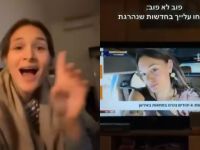Despite the fact that black Arabs have been an integral part of the region for ages, the Arab media, drama, cinema and even daily-use language is still dominated by racist and offensive portrayals of black people.
The representation of the black community as a material for mockery and derogatory language has been ongoing for years and it reaches the peak in Ramadan; the drama season when families gather at night to watch supposedly family-friendly TV content.
Yet every year, the content fails to avoid the racist and offensive language against black communities in the Middle East.
For the past week alone, two videos from Egyptian and Libyan TV shows went viral and faced a massive backlash for presenting a racist and disrespectful content against black people.
One of them showed an Egyptian actress, known as Shaimaa Seif, adorning a black face on a TV prank show imitating Sudanese women. Not only this, the actress rides a public minibus trying to annoy people by raising her voice and uttering 'gibberish' in a clear representation of the accent of Sudanese women. She even tries to steal the phones of those on the bus for the benefit of the camera.
The show has already sparked anger and condemnation by Sudanese and Egyptians who demanded that Seif apologizes and called for a boycott of the TV company.
In today’s news of #Arab being #racist as fuck. Shaimaa Saif, an Egyptian actress in full #blackface presenting a new prank show.
— #Sudan_revolts?? (@bebo_bero) May 8, 2019
Dear shaimaa saif (and I can’t stress this enough) FUCK YOU #شمياء_سيف pic.twitter.com/JwYxlyjjpZ
Another video emerged this week and was taken from a Libyan prank show. It represents a black woman who has children depicted as animals.
The video has also gone viral on the internet sparking discussions on the racism in the Arabic media and how normalized it has become.
This is probably the worst example I’ve seen of blackface on Arab TV. “African” woman surprising people with her monkey “children”. Also a prank show being broadcast during this Ramadan, on Libya al-Ahrar TV channel pic.twitter.com/nvjRjbqQVK
— Abdirahim Saeed (@AbdirahimS) May 12, 2019
Unfortunately, the anger and controversy on the internet did not succeed in making its way into the wider society and creating debate among people. Therefore, it led people to work on exposing it more through sharing videos and scenes from Arabic drama that offends black people and highlights the racism exposed in society.
This led Abdullahi, or as known on Twitter “Abz Captures”, to collect videos from live TV shows, movies, and music that present an offensive content against Arab black communities in the Middle East.
Couple years ago I gathered so many videos of racism towards black people in Arab countries. Racism on live TV shows, movies, music, in public, etc. I approached Al Jazeera and other networks about it but I didn’t get a response.
— Abz Captures (@AbzCaptures) April 30, 2019
For Abdullahi, the collection of tens of videos aimed at highlighting the "anti-blackness" in the Arab world represented through its media.
In a thread on Twitter, he shared dozens of videos he has been collecting for years of scenes taken from the Arabic media showing how racism has been making its way for years and up till now.
1. Seaedy Fel Gamaa El Amricia - In this scene Samara, (black prostitute) is heavily mocked by Khalaf, when he says, "Why are you turning off the light? You're already dark by nature." Followed by “You know what? Everybody saw the red night except for me, I got the black one." pic.twitter.com/7cP3N2JLlz
— Abz Captures (@AbzCaptures) May 4, 2019
It is a sensitive topic that is often underreported in the region, yet it should be discussed more and awareness needs to be raised about it, Abdullahi told Al Bawaba Node.
8. Block Ghashmara or The Block of Jokes ( Kuwaiti Comedy TV series), this series dedicated a whole episode to actors in blackface portraying Sudanese people as lazy and cynical. pic.twitter.com/BYjBLOk28b
— Abz Captures (@AbzCaptures) May 4, 2019
In addition to the fact that most Arab countries do not criminalize racism led to its “normalization” to the level that it is never an issue as well as leading some people to defend it and accuse the black community of "playing the victim" whenever it is denounced.
The matter of normalized racism in the Middle East had been brought out to the media two years ago when an Egyptian TV show called “Rayah El Madam” featured one of the main characters describing an Egyptian-Nubian musical band called “Black Theama” as “Black Teena [mud]” referring to the black singers of the band.
6. Rayah El Madam (TV Series) - The main characters are in blackfaces portraying a negative stereotype of African-Americans in a club. One of them approaches a black woman at a bar, the other asks what he's doing. He says "I don't know I thought she matches what we're doing." pic.twitter.com/3hpVdr5Sh3
— Abz Captures (@AbzCaptures) May 4, 2019
The issue made people angry then which led the Amir Salahudeen, the band’s leader, to take his outrage on Facebook. He was then invited on several talk shows to discuss this issue. However, people criticized him for insisting to keep talking about the matter even though the TV show producers made an apology.
Yet, those are few examples of the anti-black sentiment being reflected on a daily basis in the daily lives of Arabs.
A few months ago, a wide discussion was made on Twitter among Arabs and Muslims, highlighting the issue of using a commonly-used word to refer to black-skinned people in the Middle East instead of the use of: “عبيد” [Abeed] which literally translates into “Slaves”.
As much as degrading the word sounds, some Arabic-speakers still use it. Meanwhile, many believe it is now being used less than before with more efforts being paid into educating people on the actual meaning it holds.







